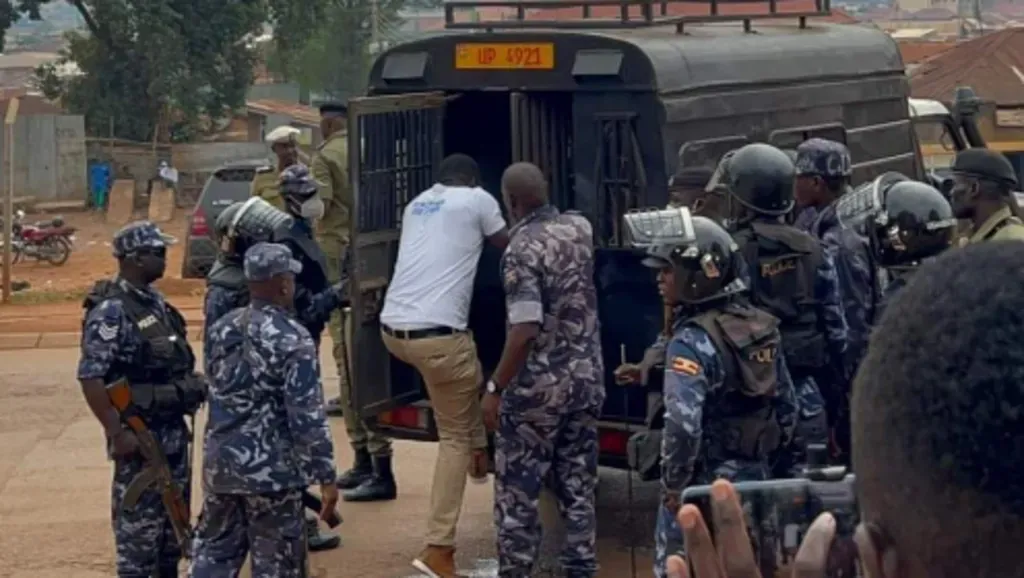In the heart of Uganda’s capital, Kampala, a tense and troubling situation has been unfolding. The political landscape is charged as the nation braces for potential unrest and demonstrations. Bobi Wine, Uganda’s prominent opposition leader, has raised alarms about the increasing pressure from security forces on his party’s headquarters. This escalation comes on the eve of a planned anti-government protest, igniting a series of reactions and responses from both sides of the political spectrum.
Escalating Tensions: The Situation in Kampala
The Siege on National Unity Platform Headquarters
As the sun set on the eve of the scheduled demonstration, the offices of the National Unity Platform (NUP) transformed into what Bobi Wine describes as a “military barracks.” According to reports, security forces, including soldiers and police, surrounded the NUP headquarters with an imposing show of force. This move is not merely a precaution but a dramatic display of control, with the authorities allegedly conducting “violent arrests” of several party officials.
Despite these serious allegations, police have yet to confirm the arrests. However, they have stated that these actions are part of “precautionary steps” aimed at preventing any “mobilisation for the protest.” This rhetoric suggests a strategic intent to preemptively quash any organized opposition, rather than merely responding to imminent threats.
Presidential Warnings and Public Sentiments
President Yoweri Museveni, who has been at the helm of Uganda’s leadership for nearly four decades, has issued a stern warning regarding the planned march to parliament. His statement reflects a deep-seated concern about the potential consequences of the protest. Museveni’s warning, delivered on Saturday, frames the organisers of the march as “playing with fire,” highlighting his administration’s readiness to confront dissent.
In the backdrop of this political drama, young Ugandans have mobilised fervent support for the demonstration. Their demands focus on addressing what they perceive as rampant corruption and poor governance. The movement has drawn inspiration from similar protests in neighbouring Kenya, where recent mass demonstrations forced the government to reconsider controversial tax increases.
Bobi Wine, whose real name is Robert Kyagulanyi, has become a central figure in this turbulent period. Despite not formally organizing the protest, he has expressed support for “every effort to protest against injustice, corruption, and misrule.” This support, coupled with his high-profile status, has made him a lightning rod for both admiration and controversy.
The Crackdown and its Implications
In a statement on social media platform X, Bobi Wine denounced the actions of the security forces, calling them “cowards” and accusing them of obstructing access to the NUP headquarters. The situation has raised significant concerns about the erosion of democratic freedoms and the right to peaceful assembly in Uganda.
Police spokesperson Kituuma Rusoke responded by indicating that the NUP’s activities had raised a “red flag,” prompting the precautionary measures. This defensive stance reflects a broader strategy to suppress dissent and maintain political control, especially as the regime faces increasing scrutiny and pressure from both domestic and international observers.
Historical Context and Political Dynamics
Bobi Wine’s Role in Ugandan Politics
Bobi Wine’s rise from a music star to a formidable political figure has been marked by both significant achievements and intense challenges. Elected to parliament in 2017, Wine has become a leading voice of opposition against President Museveni’s long-standing rule. His candidacy in the 2021 presidential election, though marred by allegations of state repression, underscored his role as a central figure in Uganda’s political landscape.
The NUP, under Wine’s leadership, has become a beacon for those dissatisfied with the status quo. However, the party’s activities have been met with increasing resistance from the government, which has employed various measures to stifle dissent and maintain its grip on power.
The Legacy of CCM in Tanzania
While Uganda grapples with its own political turmoil, Tanzania has also experienced its share of political upheaval. The recent removal of Tanzania’s Information Minister, Nape Nnauye, following controversial remarks about election rigging, highlights the broader challenges facing African democracies. Nnauye’s comments, made during a rally, suggested a troubling view of electoral integrity, leading to his dismissal and a significant public outcry.
Kenya’s Ongoing Protests
In Kenya, the political landscape is similarly fraught with tension. Protesters have threatened to occupy the international airport in Nairobi, demanding President William Ruto’s resignation and justice for victims of police brutality. The protests, which began on 18 June, have already resulted in significant loss of life and injury, further compounding the political crisis in the region.
Raila Odinga, Kenya’s main opposition leader, has voiced solidarity with the protesters, emphasizing the need for justice before engaging in dialogue with the government. This position complicates Ruto’s efforts to include opposition members in his cabinet, aiming to defuse the unrest.
The Broader Implications
Impact on Democracy and Governance
The events in Uganda, Tanzania, and Kenya reflect broader issues of governance, democratic integrity, and the struggle for political freedoms in Africa. The crackdown on opposition figures and the suppression of protests highlight ongoing challenges in maintaining democratic principles and addressing citizen grievances.
International Reactions and Support
International reactions to these events vary, with calls for greater transparency, accountability, and respect for human rights. The global community continues to monitor the situation closely, with various stakeholders advocating for peaceful resolutions and the protection of democratic values.
Conclusion
The political turmoil unfolding in Uganda, alongside similar challenges in Tanzania and Kenya, underscores the complex and often contentious nature of governance in the region. As Bobi Wine and other opposition leaders face increasing pressure, the international community remains vigilant, hoping for resolutions that uphold democratic principles and address the pressing issues of corruption and misrule.


